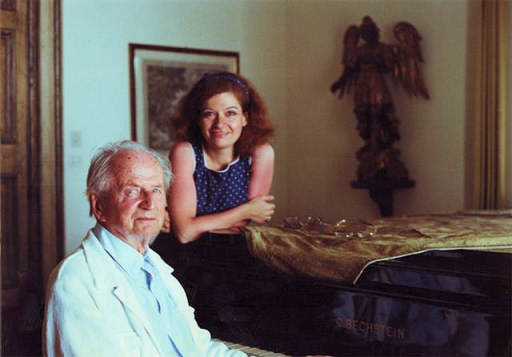Other Links
Editorial Board
-
Editor - Bill Kenny
-
Deputy Editor - Bob Briggs
Founder - Len Mullenger
Google Site Search
SEEN AND HEARD INTERNATIONAL CONCERT REVIEW
Bach/Kempff, Gluck/Kempff, Chopin, Kreisler/Rachmaninov, Wagner/Liszt : Idil Biret piano, Megaron, the Athens Concert Hall 23.5.2009 (BM)
J.S.Bach / Kempff: Sinfonia from Cantata BWV 29
Gluck / Kempff: Ballet from the opera Orpheus et Eurydice
Chopin: Nocturne op. 55 no.2
Tarantelle op. 43
Andante Spianato et Grande Polonaise op. 22
Kreisler / Rachmaninov: Liebesfreud
Wagner / Liszt: Tannhäuser Overture

Idil Biret and Wilhelm Kempff in Positano, Italy 1982
For its 30th anniversary, the Gina Bachauer International Music Association invited distinguished Turkish pianist Idil Biret to Athens for a commemorative recital – and it was memorable indeed. At a press event prior to the concert, Biret spoke of the many times she attended London concerts and marveled at Bachauer’s pianism, in the great, fading tradition of pianists such as Cortot, whom both studied with. Sadly, there are very few recordings of Bachauer’s playing to remind us of her art – but fortunately the exact opposite is true of Biret. Impressive recordings of the complete piano works of Chopin, Brahms and Rachmaninov, among many others (including contemporary works such as the Boulez sonatas and Ligeti etudes), have long made hers a household name.
This evening’s program was dedicated to the theme of transcriptions for the piano, clearly inspired by the legacy of Wilhelm Kempff (with whom she performed Mozart’s concerto for two pianos at the tender age of 11), perhaps Biret’s most influential teacher after Nadia Boulanger, whom she studied with in Paris on a scholarship from the Turkish government after having been discovered as a child prodigy in Ankara.
The Bach and Gluck pieces transcribed by Kempff chosen to kick off the recital were played fluidly and with great expression, revealing a pianist firmly established in the romantic repertoire. These were followed immediately by the first highlight of the evening, three works by Chopin performed in the relative intimacy of the Megaron’s smallest auditorium, the Dimitris Mitropoulos Hall, eminently suited to this music once pioneered in Paris salons. Biret has often deplored the fact that the culture of perfect legato is dwindling among contemporary pianists. ‘Her’ Chopin proved that she herself is in total command of it, and could no doubt give a worthwhile recital on a piano with a faulty pedal if she were obliged to. The least well-known of the Chopin pieces was perhaps the Nocturne with its beautiful duet of two overlapping melodic lines, played with a rare richness in timbre and singing tone. The Tarantelle and Grande Polonaise were performed with the requisite verve and virtuosity, yet as if keeping in mind a self-imposed limit of sound, or, in other words, and the faculties of the human voice which were the basis for Chopin’s pianism.
Of the two further transcriptions following the interval, the overwhelming Tannhäuser Overture was an appropriate finale to an imposing program. To those of us brought up without much Wagner because of the way his music was used for Nazi propaganda, this is perhaps the piece that can provide a sense of what we missed out on. It also shows how misleading it can be to apply labels to composers. For example, Chopin and Liszt are both widely referred to as ‘romantic’, although no two worlds of sound could be more different from each other (as Biret points out in the liner notes to her Chopin recordings), the former modeled on the art of bel canto singing and the latter inspired by an attempt to reproduce the wealth of the orchestral palette on the modern pianoforte -although this is but one aspect of Liszt’s vast oeuvre. Or, as Rubinstein once put it, somewhat more judgmentally, when teaching Chopin: “Not so pompous - pompous is for Liszt!”. No artist is more aware of this difference than Idil Biret (she herself has said that Liszt had a grasp of harmony ahead of his time, misunderstood to this day in her opinion), as became apparent from her incredibly lavish and articulate performance, worthy of a pianist whose first recordings were Liszt’s transcriptions of Beethoven symphonies – and who reproduced those very symphonies at home at her piano after hearing them in concert when she was just a little girl, before she even learned to read music.
Perhaps it is because all of this came so naturally to her from the very beginning that she can reel off a substantial program like this (including three encores: Bach and Händel transcriptions by Kempff and one of Brahms’ Hungarian Dances, transcribed by the composer himself) as if there were nothing to it. What a shame that her work for the bargain label Naxos has made her unpopular at times with other record companies, as well as with concert organizers. She herself doesn’t seem to mind all that much, though. “The music, my life’s work, is all that counts,” she is quoted as saying in the book about her life by Dominique Xardel, “I feel very privileged to be able to have a profession that I love”. Great modesty on the part of a great pianist. (Read more at
www.idilbiret.eu)
Picture © Şefik
Yüksel
Bettina Mara
Back to Top
Cumulative Index Page
